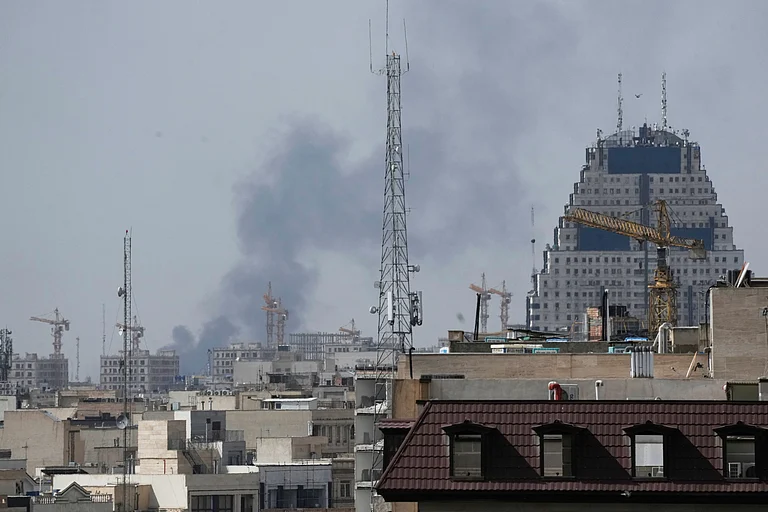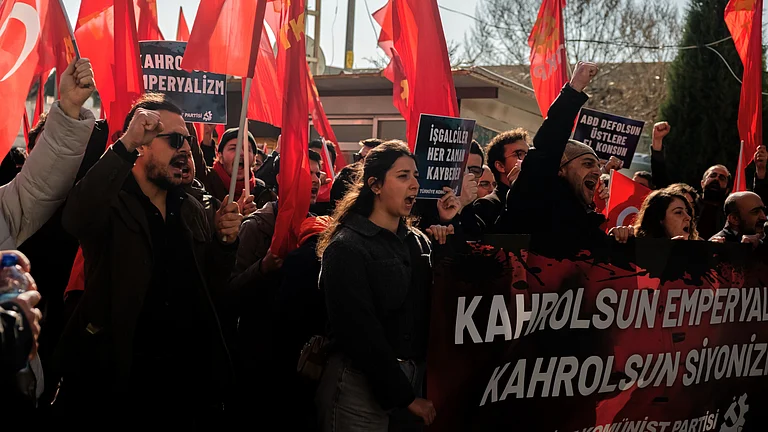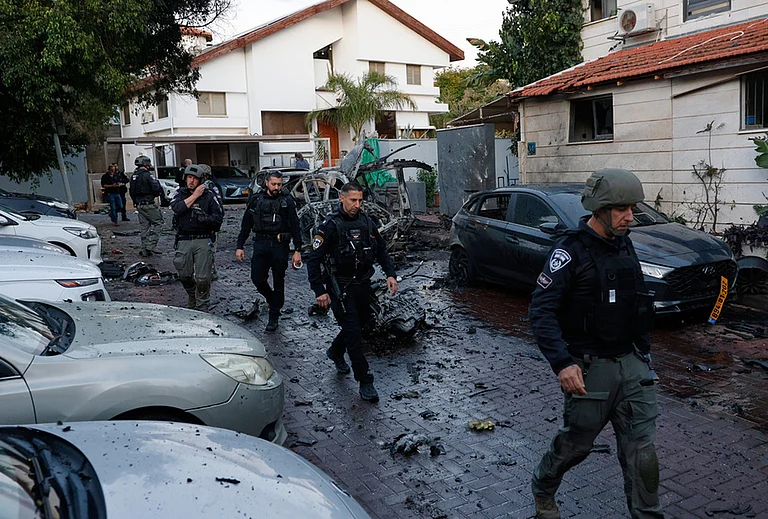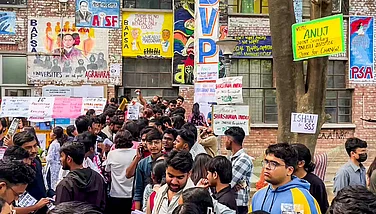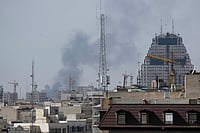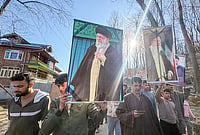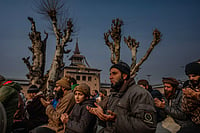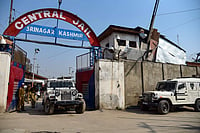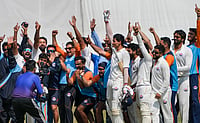When his daughter completed her Class 12 exams four years ago, Feroze Ali began weighing options for a medical degree that wouldn’t break the bank. Iran emerged as a practical choice. The MBBS course there would cost the family about Rs 30 lakh, a fraction of what most private colleges in India charge. The country’s cultural setting, too, felt familiar enough for the conservative Kashmiri Muslim household.
Nazima Feroze, now 23 and in her final year at Iran University of Medical Sciences, said studying in Tehran offered both academic comfort and a cultural rhythm that closely mirrored home. Speaking to us at her family’s home in Chadoora, Central Kashmir, soon after her sudden return home in the wake of the Israel-Iran conflict, she said religious practices like the hijab were naturally woven into everyday life.
“There is a strict rule to observe hijab in Iran, which is part of Islamic culture. People in Iran wear religion on their sleeves; they seemed to be defiant in the face of attacks on their country,” said Nazima, as her father, in the background, kept on talking to someone over the phone, smirking as he shared the news of the ceasefire between Israel and Iran.
Nazima, who is in the final year of her MBBS at Iran University of Medical Sciences, was among the second batch of students evacuated from Iran to Kashmir. Her studies had been progressing well before the war between Israel and Iran, which began with strikes by both countries on each other’s territory on June 13. A ceasefire is now in place between the two nations, for now.
Students recalled the difficult time of being moved from one city to another in Iran as missiles flew overhead and bombs destroyed several structures, leaving scores dead and thousands wounded as the conflict between the two countries escalated. While drones, missiles and bombs rained down from the skies, it is the ground that bore the scars of their torment.

When red streaks lit up the sky and a barrage of missiles echoed through the night, Sehreen Parvaiz, 24, a Kashmiri student pursuing medical education in Tehran, struggled to sleep. Now back at her home in Chadoora, just half a mile from Nazima’s, Sehreen—her head also covered in a hijab— spoke in the presence of a female relative, in a room where a framed photograph of Mecca hung on the wall.
Sehreen said she had always felt at home in Iran and there had never been any reason for her family to worry about her safety, except during the recent war when bombs hit Tehran, causing devastation across the city. Before returning to Srinagar, she witnessed the destruction firsthand and recalled seeing smoke rising from a burnt structure on her way to Mashhad, from where she was evacuated.
“We were living just fine except during the war. When the missiles lit up the sky, I had sleepless nights and my parents were particularly worried about my safety. Locals, it seemed, were less impacted by the bombing and they carried on with their lives, possibly because they had previous experience of such situations,” she said.
Sehreen, who flipped through videos of the damage caused during the bombing in Iran, said that authorities had alerted them in the past as well about a possible evacuation, but the situation had never escalated to that extent. “Earlier, our documents were also taken by officials of the Indian embassy for a possible evacuation during tensions between Iran and Israel, but it was only this time that the actual evacuation happened. The situation was never as bad as it was this time,” she said.
After the war, several families remain worried about the safety of their children returning to Iran. Students eager to resume their studies said that the start of classes would be delayed, as families want them to stay in Kashmir a little longer. The war had caused anxiety among many students, who are now relieved following the ceasefire.
Twenty-four-year-old Safdar Bashir watched red streaks in the night sky from the roof of his apartment building in Tehran. Before his evacuation, bombs began falling closer, and on his way from Tehran to Qom, he saw vehicles that had been destroyed. He became particularly worried after learning that a hostel had also been targeted just a few kilometres from the Iran University of Medical Sciences, where he has been pursuing his education.
Students from Srinagar, who had fled the war said that the culture in Iran is in many ways similar to that of Kashmir, which is why they felt at home there. Several female students said they are required to wear the hijab in Iran, a practice they have continued after returning to Kashmir from the war-affected country. In Kashmir too, a large number of women step out in veils that cover their faces.
In Iran, students said they routinely visit mosques, although some mentioned that they were unable to watch films due to the language barrier, as most movies are in Persian. They also noted that women police officers are present on the streets to enforce the dress code. Those pursuing medical education added that they had not come across any place where alcohol is served.
“We were living just fine except during the war. When the missiles lit up the sky, I had sleepless nights. my parents were worried about me.”
Western powers have criticised Iran for measures such as the dress code, accusing its current regime of suppressing basic rights, brutalising its people and fuelling terrorism abroad.
Irtiqa Zahoor, a fourth-year MBBS student in Iran, said, “There is a women’s morality police force, and I have seen them patrolling the roads to enforce the dress code. Although the authorities are not strict with tourists and Tehran attracts many foreigners, women still follow a dress code and have to wear the hijab in the Iranian capital too.”
She said that studies at her medical school remain suspended during afternoon prayers, and she was aware of incidents where people’s hands were chopped off for theft.
“We have learnt of measures such as penalties and imprisonment for not following the rules of the Islamic country on hijab. I believe it is good. Since our culture in Kashmir more or less matches that of Iran, our parents feel assured that we are safe there. The laws are much better in Iran. I recently boarded an e-bus here in Kashmir and found there were no separate seats for females, unlike in Iran, where proper segregation between men and women is observed,” said Irtiqa.
For parting, she said: “There are open community gatherings which I came across in parks, where families could be seen sharing food, and there are no discotheques that I am aware of.”
Salman Ali, a Kashmiri student from Srinagar’s Lal Bazar area, said: “We couldn’t watch any movies in cinemas as they are in the Persian language. Life is largely Islamic and there is free movement of people during the night hours as well.”
Iran has remained a popular choice for families in Kashmir, both for its Islamic culture and the comparatively lower cost of medical education. A large number of students are opting to pursue MBBS degrees, as the profession remains the most sought-after in Kashmir after engineering. Iran is seen as a preferred destination for being more affordable than countries like Bangladesh, Kazakhstan and Kyrgyzstan.
In response to the growing demand among students to study medicine in Iran, several educational consultancies have opened in Kashmir. Some consultancies headquartered in Delhi have also set up offices in Srinagar to help facilitate student admissions to medical colleges in Iran.
Mohd Asif, who runs Solution Career Consultancy in Srinagar, said that parents have been choosing Iran for medical studies because tuition costs there are significantly lower than in other Muslim countries such as Bangladesh, Kazakhstan and Kyrgyzstan.
“The cultures in other countries are modern, whereas it is Islamic in Iran, which is why parents prefer to send their children there for medical education. Admissions to Iran have been heavily impacted due to the war and other political uncertainties over the last two years,” said Asif. “The MBBS degree costs up to nearly Rs 20 lakh in Iran, whereas the expenses almost double and can go over Rs 45 lakh in Bangladesh,” he said.
Neelesh Jha, Manager at RMC Education Service Centre, said that of the 20 to 30 students they send each year to pursue MBBS in Iran from across India, nearly 50 per cent are from Kashmir. “We are running a franchise in Srinagar and many parents have been expressing interest in sending their children to Iran for education,” he said.
At his home in Chadoora, Feroze said that they secured admission in Iran through an educational consultancy firm. He explained that pursuing an MBBS degree at a private university in India costs over Rs 1 crore, while the family would spend only Rs 30 lakh on their daughter’s education in Iran.
“We managed admission through a consultancy in Srinagar, and since a medical degree requires a lot of hard work, we hope that my daughter can resume her studies quickly,” said Feroze.
Some students also said that the cost of the entire MBBS course in Iran can be as low as Rs 7 to 8 lakh. “I got a scholarship in Iran, and the annual tuition cost is $1,500, which is significantly lower than the costs we have to bear here,” said Faizan Nabi, another Kashmiri student studying in Iran.
Despite the political uncertainty in the region, more than 1,300 students, mostly pursuing MBBS degrees, are currently studying in Iran. Interest has remained strong, even though, according to some students, authorities in the past had also alerted them about possible evacuation following the tit-for-tat missile and bombing strikes between Iran and Israel in September last year.
Tensions in the region had risen the previous year after the killing of Hezbollah leader Hassan Nasrallah in Israeli airstrikes on Lebanon’s capital, Beirut.
Despite this, Iran continues to attract students from Kashmir for medical education. Taseem Ashraf, 22, who is pursuing an MBBS degree in Tehran, said he joined the course only last year. “I wrote some papers, but there were exams for some of the subjects that were still pending before the war between Iran and Israel broke out,” he said.
MORE FROM THIS ISSUE
Ishfaq Naseem is senior special correspondent, Outlook. He is based in Srinagar







